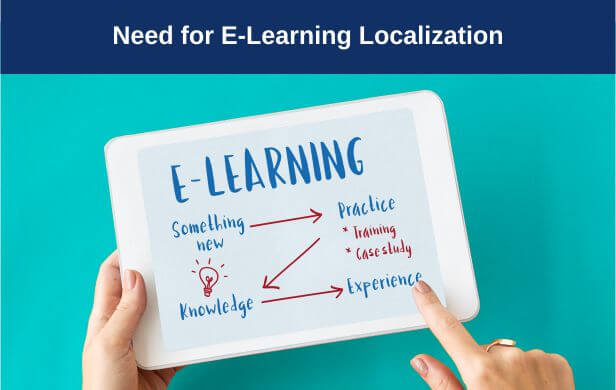
E-learning has become increasingly popular as a way to deliver education and training to learners around the world. For e-learning to be effective, it must be localized to meet the learners' specific linguistic, cultural, and technical requirements. Let us understand the importance of e-learning localization and the challenges faced in achieving effective e-learning localization.
First, e-learning localization is essential because it helps ensure that the content is culturally appropriate and relevant for the learners. Different cultures have different values, beliefs, and behaviors, and it is essential to take these into account when developing e-learning content. Localization can adapt the content to the learners' culture, making it more engaging and effective.
Secondly, language is a significant barrier to learning, and e-learning localization can help to break down this barrier. By localising the content into the learners' native language, e-learning can improve learners' comprehension, engagement, and retention of the material. This can also help to make the learning process more accessible to learners who may not have a strong command of English or other widely spoken languages.
Thirdly, different cultures have different learning styles, and e-learning localization can help to ensure that the content is adapted to the learners' preferred learning style. For example, some cultures prefer visual aids, while others prefer text-based content. E-learning localization can help ensure that the content is delivered in an engaging and effective way for the learners.
However, achieving effective e-learning localization can be challenging. One of the major challenges is the cost of localization. Translating content into different languages and adapting it to different cultures can be expensive and time-consuming. Organizations must be willing to invest in e-learning localization to ensure that it is effective.
Another challenge is the lack of expertise in e-learning localization. Localization requires specialized knowledge and skills, and many organizations may not have the necessary expertise in-house. This can make it difficult to achieve effective e-learning localization without outsourcing to a third-party provider.
E-learning localization is adapting e-learning content to meet learners' linguistic, cultural, and technical requirements in different geographic locations. Here are some reasons why e-learning localization is necessary:
Thus, e-learning localization is essential for organizations that want to deliver effective and engaging e-learning content to learners worldwide. It can help bridge the cultural and linguistic divide and ensure learners access to content that meets their needs and preferences. However, effective e-learning localization requires significant time, money, and expertise. Organizations must be willing to make this investment to succeed in the global e-learning market.
Language Services Bureau has a holistic approach towards E-learning Localisation, which involves complete, accurate and appropriate eLearning materials with quality and speed in all the major languages. With its experience of more than 43 years, Language Services Bureau has the required expertise in the fields of global e-learning market and ensures complete language assistance.
For any queries related to language translation services. Inquire at our email address below or give us a call today!
info@languageservicesbureau.com
Telephone: +91-20-24470509, +91-82370 60559
Similar articles for you...

आमच्या गेल्या महिन्यातील ब्लॉग मध्ये भाषांचे ज्ञान आवश्यक असणाऱ्या करियर क्षेत्रांची माहिती आपल्याला मिळाली. जिथे भाषेचे ज्ञान फायद्याचे ठरते असे इतर व्यवसाय आपण या महिन्यात पाहुयात.

Posted by : Language Services Bureau

The time it takes to learn a language depends on what you want to do with it– here is a great article about language learning and the kind of expectations you can set about the time required for the same!